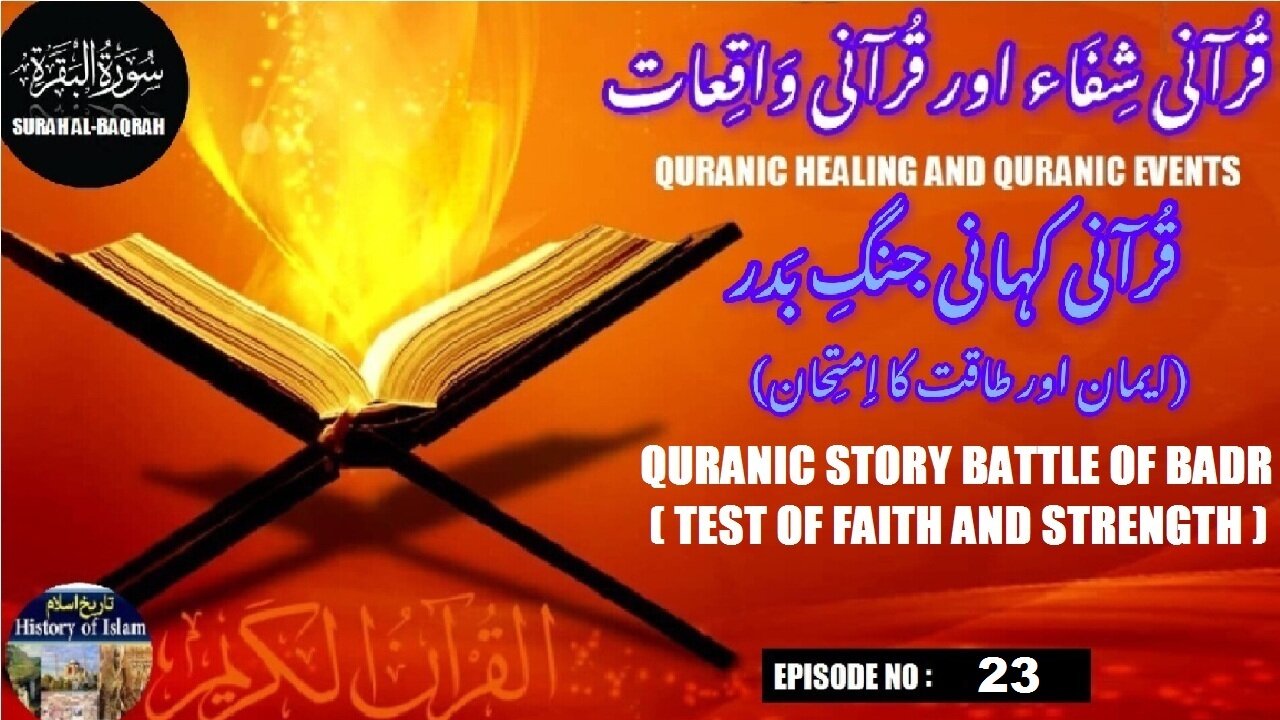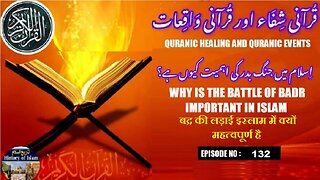Premium Only Content

Quranic Story Battle of Badr Test of Faith and Strength ایمان اور طاقت کا امتحان بدر کی قرآنی کہانی
@islamichistory813 #story #islamic #battles #english #urdu #battlesofbadr #battles #islamichistory #battle #trench #badrkidastan #thestoryofbadr #quranic #stories #faith #victory #greatest #general #introducing #shortstory #battle #confederates #jungebadr #violators #sabbath #battleofbadr
Quranic Story The Battle of Badr: A Test of Faith and Strength
Brothers, sisters, friends and elders, Assalamu Alaikum Wa Rahmatullahi Wa Barakatuh.
We welcome you to the Islamic informative series episode No 21 on healing and events from the Holly Quran, in this video we will describe,Quranic Story The Battle of Badr: A Test of Faith and Strength
The Battle of Badr, one of the most pivotal events in Islamic history, is alluded to in the Qur'an, notably in Surah Al-Baqarah, verses 214–216. Although the battle itself is not explicitly detailed in these verses, they serve as indirect references to the struggles, trials, and tests of faith that the early Muslim community faced, including the military challenges they encountered. These verses provide insight into the spiritual and emotional trials that the Muslims experienced as they fought for their survival and the establishment of Islam in a hostile environment. The Battle of Badr is a profound example of how trials, especially those of a military nature, test the belief, patience, and trust of the believers in Allah (SWT).
The Battle of Badr, fought in 624 CE, occurred when the early Muslim community in Medina was faced with an imminent military threat from the Quraysh of Mecca. The Quraysh, who had long opposed the Prophet Muhammad (PBUH) and his message, sought to annihilate the nascent Muslim community. Tensions had been building for years, and the Muslims, having migrated from Mecca to Medina to escape persecution, were determined to defend themselves. The Muslims faced not just a military challenge but a spiritual one as well—an immense test of faith, courage, and reliance on Allah.
Surah Al-Baqarah, verses 214–216, reflect the internal and external trials faced by the early Muslims during this period. In verse 214, Allah (SWT) says, **"Or do you think that you will enter Paradise while such [trial] has not yet come to you as came to those who passed on before you?"** This verse alludes to the early Muslim community’s belief in the promise of Allah’s reward in Paradise, but it reminds them that such a reward can only be attained through perseverance in the face of trials. These trials, which include physical hardships, persecution, and, in some cases, military confrontations, are an inevitable part of the journey of faith. Allah tells the believers that they will not achieve the bliss of Paradise unless they endure the same kinds of difficulties that the previous communities faced.
The early Muslims had already experienced great trials before the Battle of Badr. They had been subjected to economic boycotts, physical abuse, and social ostracism. Some of the believers were tortured and martyred by the Quraysh, and yet their faith remained strong. This verse signifies the understanding that such trials are not just tests of physical endurance but spiritual tests, challenging their commitment to Allah’s commands. The context of this verse could easily be seen as preparing the Muslims for the greater tests that lay ahead, including the imminent battle that would ultimately become a turning point in the history of Islam.
In verse 215, Allah reminds the believers, **"And when the believers saw the alliance, they said, 'This is what Allah and His Messenger had promised us, and Allah and His Messenger spoke the truth,' and it increased them only in faith and acceptance."** This reference could be seen as a reflection of the battle itself, where the early Muslims, despite being vastly outnumbered and less equipped than their enemies, remained steadfast in their faith. The “alliance” here refers to the Quraysh’s mobilization of a large army to confront the Muslims. The sight of the approaching Quraysh forces was a moment of intense fear and uncertainty for the believers. However, despite these fears, the Muslims reaffirmed their belief in Allah’s promise of victory and support. This moment is important because it shows the unwavering faith of the early Muslims, who, rather than being intimidated by the size and strength of the enemy, found strength in their belief that Allah would fulfill His promises.
The phrase **"this is what Allah and His Messenger had promised us"** points to the earlier revelations and prophecies that had been given to the Muslims. The Prophet Muhammad (PBUH) had repeatedly told the believers that victory would come from Allah if they remained firm in their faith. Even though the Muslims faced overwhelming odds, they trusted in the truth of these promises, demonstrating the deep level of faith they had in the Divine plan. This is a key aspect of the Battle of Badr: while they may have lacked the military resources, their spiritual strength and unwavering faith were the true sources of their success.
Verse 216 continues the theme of trial and struggle, saying, **"Fighting is prescribed for you, though it is hateful to you. But perhaps you hate something and it is good for you, or you love something and it is bad for you. And Allah knows, while you know not."** This verse serves as a profound reminder that the trials and challenges faced by the believers are not always as they appear. While the Muslims initially found the idea of fighting distasteful, especially given the nature of warfare and the personal sacrifices involved, it was through this very battle that they would experience victory and divine support. Allah (SWT) makes it clear that there is wisdom behind the trials, even if they are difficult to understand at the time. The Muslims’ willingness to fight in the Battle of Badr, despite their reservations, was an act of obedience to Allah’s command, and it proved to be the key to their eventual success.
This verse is particularly significant because it highlights the concept of divine wisdom: Allah knows what is best for His servants, even if they cannot see it at the moment. The early Muslims could not have foreseen that their victory at Badr would be the catalyst for the spread of Islam and the eventual triumph of the Muslim community over their adversaries. The Battle of Badr, despite its hardships, became a turning point in the history of Islam, and the Muslims’ success was not merely due to their military tactics but, more importantly, their trust in Allah and their perseverance in the face of hardship.
The battle itself took place in the month of Ramadan, when the Muslims, who were fasting, were confronted by the Quraysh army. The Quraysh, numbering around 1,000, were well-equipped, while the Muslims, with a force of around 300, were poorly armed. Despite being outnumbered three to one, the Muslims had an immense spiritual advantage. Allah (SWT) sent angels to aid them during the battle, a divine intervention that turned the tide in their favor. The victory at Badr was a testament to the power of faith and the importance of relying on Allah’s support in the face of overwhelming odds. The victory also proved that it was not military might that secured success but the sincerity of the believers’ faith and their commitment to Allah’s commands.
The Battle of Badr, as alluded to in Surah Al-Baqarah, represents more than just a physical confrontation; it symbolizes the internal struggle of the believers. The Muslims were tested not only in battle but in their faith, obedience, and trust in Allah’s plan. They faced external pressure from the Quraysh and internal doubts, but their steadfast belief in the promises of Allah and their acceptance of the trials they encountered enabled them to triumph. The Qur'an’s indirect references to these struggles underscore the fact that every trial faced by the believers is a test—one that can either lead to victory or to failure, depending on how the believers respond.
In conclusion, the Battle of Badr, although not detailed in Surah Al-Baqarah, is alluded to in a way that emphasizes the spiritual and moral lessons of the battle. It was not simply a physical confrontation but a test of faith, patience, and reliance on Allah’s wisdom. The early Muslims, despite their fears and reservations, were able to overcome their adversaries because they trusted in Allah’s plan and embraced the trials they were given. The references in verses 214–216 of Surah Al-Baqarah serve as a reminder that trials, especially those that are difficult to endure, have hidden blessings and wisdom, and they offer the believer an opportunity to grow stronger in their faith. The victory at Badr, against all odds, remains a profound testament to the power of belief, the importance of patience, and the ultimate triumph of truth.
With this, we seek your permission until tomorrow and pray to Allah Almighty to grant us the ability to follow the injunctions of the Quran and the Prophetic Hadith, Amen
Allah Hafiz.
=========================
-
 0:08
0:08
ISLAMIC HISTORY
2 hours agoWhy is the Battle of Badr important in Islam اسلام میں جنگ بدر کی اہمیت کیوں ہے ؟
1 -
 LIVE
LIVE
Dear America
1 hour agoNO MORE BURNING FLAGS!! 🇺🇸 Trump Signs Order Making It ILLEGAL!! + Trump Is SUING NEWSOM!
5,233 watching -
 27:39
27:39
Crypto.com
36 minutes ago2025 Live AMA with Kris Marszalek, Co-Founder & CEO of Crypto.com
-
 LIVE
LIVE
Law&Crime
1 hour agoLIVE: Adelson Matriarch Murder Trial — FL v. Donna Adelson — Day 3
226 watching -
 LIVE
LIVE
JuicyJohns
1 hour ago $0.23 earned🟢#1 REBIRTH PLAYER 10.2+ KD🟢
119 watching -
 LIVE
LIVE
Surviving The Survivor: #BestGuests in True Crime
1 hour agoCourt Stream: Donna Adelson Trial DAY 3 of Testimony
51 watching -
 LIVE
LIVE
Wendy Bell Radio
5 hours agoWhat Hill Will Democrats Choose To Die On?
8,017 watching -
 LIVE
LIVE
LFA TV
3 hours agoLFA TV ALL DAY STREAM - TUESDAY 8/26/25
5,691 watching -
 1:15:15
1:15:15
JULIE GREEN MINISTRIES
3 hours agoTHE CIA HAS BEEN A GIANT IN THIS LAND THAT WILL BE TAKEN OUT
67.7K116 -
 3:58:26
3:58:26
The Bubba Army
1 day agoBURN The FLAG, Go to JAIL! - Bubba the Love Sponge® Show | 8/26/25
54.5K19